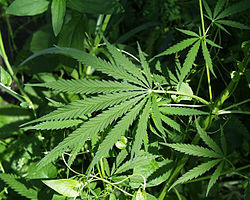Note: This is a project under development. The articles on this wiki are just being initiated and broadly incomplete. You can Help creating new pages.
Cannabis sativa - Bahuvadini
Bahuvadini is an annual herbaceous plant in the species of the Cannabaceae family. People have cultivated Cannabis sativa throughout recorded history as a source of industrial fibre, seed oil, food, recreation, religious and spiritual moods, and medicine.
Contents
[hide]- 1 Uses
- 2 Parts Used
- 3 Chemical Composition
- 4 Common names
- 5 Properties
- 6 Habit
- 7 Identification
- 8 List of Ayurvedic medicine in which the herb is used
- 9 Where to get the saplings
- 10 Mode of Propagation
- 11 How to plant/cultivate
- 12 Commonly seen growing in areas
- 13 Photo Gallery
- 14 References
- 15 External Links
Uses
Cancer, Glaucoma, HIV, Muscle spasms, Seizures, Severe pain, Severe nausea.[1]
Parts Used
Chemical Composition
Most varieties contain cannabinol and cannabinin.[2]
Common names
| Language | Common name |
|---|---|
| Kannada | ಭಂಗಿ Bhangi, ಗಾಂಜಾ ಗಿಡ Ganja gida |
| Hindi | Bhang, Ganja, Charas |
| Malayalam | Cherukanchava, Ginjilachilachi |
| Tamil | Alatam, Ananta muli |
| Telugu | Bangiaaku, Bangiaku, Gaanja chettu |
| Marathi | Bhanga, Bhrnga |
| Gujarathi | NA |
| Punjabi | NA |
| Kashmiri | Banga |
| Sanskrit | Bahuvadini, Banga |
| English | Marijuana, Hemp, Gallow grass |
Properties
Reference: Dravya - Substance, Rasa - Taste, Guna - Qualities, Veerya - Potency, Vipaka - Post-digesion effect, Karma - Pharmacological activity, Prabhava - Therepeutics.
Dravya
Rasa
Guna
Veerya
Vipaka
Karma
Prabhava
Habit
Identification
Leaf
| Kind | Shape | Feature |
|---|---|---|
| Alternate | Stipulate | Long petiolate, palmate, with 3-11, rarely single, lanceolate, serrate, acuminate leaflets up to 10 cm long, 1.5 cm broad |
.[4]
Flower
| Type | Size | Color and composition | Stamen | More information |
|---|---|---|---|---|
| Monoecious | 2.5 cm long | Yellowish | 5 poricidal stamens | The female flowers germinate in the axils and terminally, with one 1-ovulate ovary. |
Fruit
| Type | Size | Mass | Appearance | Seeds | More information |
|---|---|---|---|---|---|
| Short legume | 7-9 cm | Late summer to early fall; year round in tropics | Seeds weigh 1.5-2.5 gm/100 seeds. | {{{5}}} | {{{6}}} |
Other features
List of Ayurvedic medicine in which the herb is used
Where to get the saplings
Mode of Propagation
How to plant/cultivate
Propagation mainly by seed. Experimentally, drug plants have been propagated from cuttings but such plants do not come true as to drug content of parent.[5]
Commonly seen growing in areas
Houseplant, Sea coast, Landscape.
Photo Gallery
References
- Jump up ↑ Karnataka Aushadhiya Sasyagalu By Dr.Maagadi R Gurudeva, Page no:273
- Jump up ↑ Chemistry
- Jump up ↑ common names
- Jump up ↑ Description morphology
- Jump up ↑ Cultivation details
External Links
- Ayurvedic Herbs known to be helpful to treat Cancer
- Ayurvedic Herbs known to be helpful to treat Glaucoma
- Ayurvedic Herbs known to be helpful to treat HIV
- Ayurvedic Herbs known to be helpful to treat Muscle spasms
- Ayurvedic Herbs known to be helpful to treat Seizures
- Ayurvedic Herbs known to be helpful to treat Severe pain
- Ayurvedic Herbs known to be helpful to treat Severe nausea
- Herbs with Seeds used in medicine
- Herbs with Leaves used in medicine
- Herbs with common name in Kannada
- Herbs with common name in Hindi
- Herbs with common name in Malayalam
- Herbs with common name in Tamil
- Herbs with common name in Telugu
- Herbs with common name in Marathi
- Herbs with common name in Kashmiri
- Herbs with common name in Sanskrit
- Herbs with common name in English
- Habit - Branched shrub
- Index of Plants which can be propagated by Seeds
- Herbs that are commonly seen in the region of Houseplant
- Herbs that are commonly seen in the region of Sea coast
- Herbs that are commonly seen in the region of Landscape
- Herbs
- Ayurvedic herbs that don't have seed photos
- Cannabaceae






